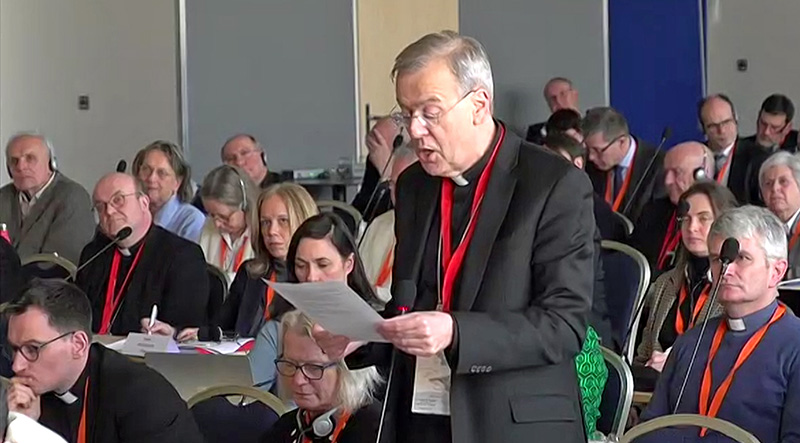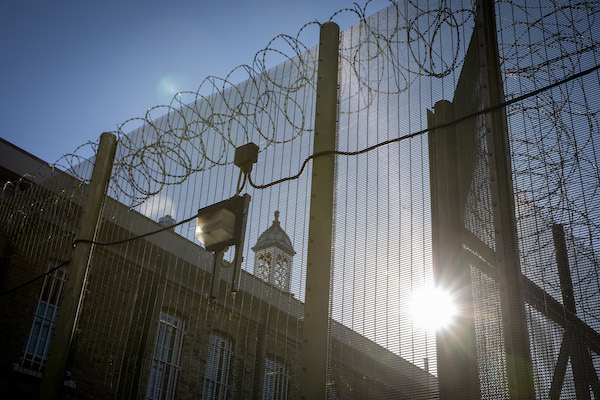I’ve been in a lot of prisons over the last 18 years. High security prisons holding people on long sentences, women’s prisons, over-crowded Victorian prisons holding men on remand who are awaiting trial, resettlement prisons and “open” prisons, which release people back into the community.
When I look at a map of England, my mind no longer turns to the local landmarks, but to the nearest jail. It’s a strange life, being the chief executive of Pact, but I wouldn’t swap it for any other job in the world.
We’re the national Catholic charity for people affected by prison. That means women and men in prison, people leaving prison, and equally importantly, their children, mums, dads, partners, and families and friends.
Being a Catholic charity means we are all about relationships, community, belonging, and hope. Hope of being redeemed, of living the kind of lives God wants for us.
But what does any of that mean for the woman who has been sent to prison because she has committed a crime as a result of mental illness? What does it mean for her children? Or for the man in prison whose physical and mental health is deteriorating to the point that his life is at risk?
Talk of “redemption” can seem remote and fanciful when people are struggling with the basics of staying alive, separated from everyone they know and love by prison walls, gates and bars.
From our beginning in 1898, Pact has responded to the needs of prisoners and their children and families.
I acted as an advisor to Lord (Michael) Farmer. His seminal reports in 2017/19 identified what we at Pact knew in a more visceral way, that when prisoners’ positive family relationships are nurtured and maintained, the risk of committing more crime on release is reduced by 39 per cent.
The Farmer reports, which were welcomed by Government, also highlighted how the support of family ties reduces the risks of violence, and of self-harm, in prison. Today rates of self-harm are at record levels.
We know of course that not every prisoner has healthy relationships with family. We know that some prisoners need to escape family backgrounds which have been abusive and harmful. But we also know that where there is a loving family, however imperfect, it offers prisoners, and the people who work with them, the hope of a fresh start.
And fresh starts for people leaving prison means safer streets, safer communities, fewer victims.
Importantly, our new report demonstrates that listening to prisoners’ families can make a life-or-death difference to people in prison.
Pope Francis has called us as a Church to be “synodal”, to listen in particular to those on the margins. A year ago, I was in the chapel at HMP Wormwood Scrubs with our president, Cardinal Nichols, who was sitting with a group of men to hear “whatever they wanted to say to him”.
Contact with their families was one of the main concerns the men brought up, together with anxieties about whether they would be accepted and welcomed by a parish after release.
They didn’t complain about the state of their prison cells, the food, or being locked up for hours every day. They didn’t claim that they were innocent. They wanted the cardinal, and the Church, to know that the two most important things for them were their families, and being able to belong somewhere when they were released.
There is a sad irony in the title of our new report: “Nobody’s Listening”. We spoke with family members whose loved one had been in prison and who had serious health concerns. We asked them about their experience of prison healthcare services.
Some good accounts were given: a fantastic mental health nurse supported someone to keep taking medication and finally get their condition under control while they were inside.
But there were too many hard to hear accounts like this one: “I just feel like my voice hasn’t been heard…I just wanted to look after him. I am his mum.”
Another family member said the same thing. They just wanted to keep their loved one alive, having cared for them before prison, and knowing that they will be the one to care for them after release.
The statistics show that at least half of prisoners have mental health problems. Prisoners’ life expectancy is on average 20 years less than the general population – indeed prisoners have the poorest health of any group in society.
Last year, at Pact we heard from over 4,000 people who wanted to tell us how worried they were about their family member’s health or mental health in prison. They wanted to talk to prison healthcare teams to explain, to share information about medication, symptoms, treatments and what works.
They know what “well” looks like and many had picked up on the signs that someone is struggling, perhaps from a phone call or a prison visit, or because the person isn’t communicating with them.
But all too often, there was no channel of communication. Prison walls, and all the natural concerns of professionals about prison security, GDPR, and patient confidentiality, means that no one was prepared to take their call.
Some families spoke of prison staff seeing them as the problem, and feeling as if they were being viewed as criminals, or troublemakers. Others simply said that no one would speak to them or listen.
Prison is prison, you might say. But what prisoners’ families articulate is that they want to help – to keep their loved one in prison alive and well – and to ensure that when they leave prison, they don’t go back.
“A prison sentence should not be a death sentence,” one person said to me.
“People recover better when their family are involved,” said one family member. “If you cut that off then you are just creating a revolving door because you are not going to find the right solution.”
The title of the report “Nobody’s Listening” came from one of the families who had spent years trying to persuade HM Prison Service that their son’s offending was due to schizophrenia. Eventually this was diagnosed, and after a spell in a secure mental health unit, with the right medication, her son’s condition stabilised. Today, he pays his taxes, has a flat, and is living a good life.
So we published the report. We facilitated families “speaking truth to power”. We brought together senior officials from the Ministry of Justice, NHS, and other organisations, to hear directly from families and to respond to the report.
The thing is, they are listening, and we will all continue to work with them to find solutions. As one senior healthcare leader said to me: “We need to see families as part of the solution rather than an inconvenience.”
Just because someone has committed a crime doesn’t mean that they are beyond the love of a family or the care of communities in wider society.
As Christians, we recognise the truth of this wisdom at a deeper level.
In Fratelli Tutti, Pope Francis says “No one can face life in isolation….We need a community that supports and helps us, in which we can help one another to keep looking ahead....how a community can be rebuilt by men and women who identify with the vulnerability of others, who reject the creation of a society of exclusion, and act instead as neighbours, lifting up and rehabilitating the fallen for the sake of the common good”.
In the light of Pact’s new report and the expertise of the family members who drove it, I might respectfully paraphrase Pope Francis and say succinctly: “No one can face a life in which Nobody’s Listening.”
So, if simply being moved is insufficient, what is an appropriate response for the Church?
Bishop Richard Moth, the lead on prisons for the bishops’ conference of England and Wales, has given Pact his full backing. He calls for fresh thinking in prison healthcare and a greater openness to engaging with family members.
“The findings reaffirm a Christian understanding of our connectedness as human beings and especially of the importance of family relationships. It is to be hoped that the report's recommendations are recognised and inspire real change in a system which so often leaves families feeling unheard and isolated.”
Pact works in 62 prisons. We are in 60 per cent of the public sector prisons across England & Wales so we are probably somewhere near you.
Our work depends on the goodwill and financial support of HM Prison and Probation Service. It also relies on volunteers, whom we train and support, to provide simple care and guidance to families.
It relies too on Catholic parishes and local communities, who share our belief in the innate dignity of every person, including those in prison. We are building a national network of parish link volunteers, people who can help us raise awareness, build safe links between parishes and prisons, and build connections. We hope this work we do will speak to readers of The Tablet.
As one family member who contributed to the report said: “I pray that changes are made to our justice system. No one will ever know how hard this journey is.”
By walking alongside people on their difficult journeys, we can offer light and hope.
Andy Keen-Downs is the chief executive of the Prison Advice and Care Trust.



 Loading ...
Loading ...
What do you think?
You can post as a subscriber user ...
User comments (0)